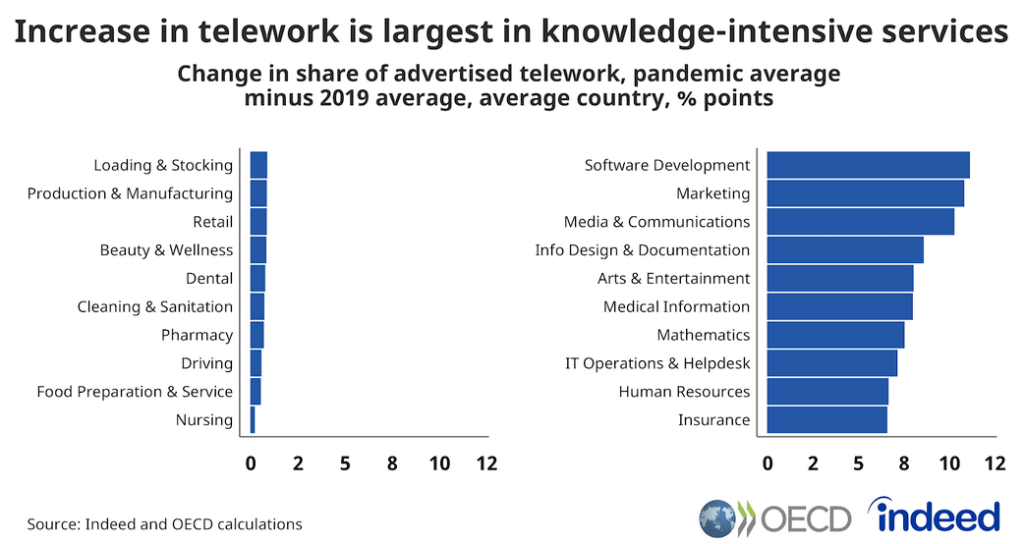According to Hiring Lab, pre-pandemic remote work postings on job boards averaged at 2.5% in January 2020, but by September 2021, remote work postings almost tripled to 7.5%. With the COVID-19 pandemic, remote hiring increased in importance and changed the hiring process of many companies. At the time, employers were forced to hire more remote workers because of worries about safety and government guidelines. Looking back, what were the remote working trends as restrictions eased up in 2022? And how are remote working trends continuing to change in 2023?
Remote Working Trends in 2022
Remote work, hybrid work, and in-person work became a widely debated topic in 2022. Depending on the industry and specific company, remote work is still widely used. Some companies like Airbnb launched the Live and Work Anywhere Initiative where employees were given the flexibility to live and work anywhere in the world. They realized how remote work would benefit their work structure and how it would keep employees motivated and loyal to the company. Employees wanted flexibility and wanted to work in places of their choosing, and Airbnb answered their inputs. They were one of the first companies to support remote work even after COVID restrictions eased up in most countries.
As you can see from the graph below, remote work increased the most in knowledge-intensive services. For example, software development and marketing had an average of 11% increases in remote work postings while jobs that require physical labor like loading and stocking or production and manufacturing only increased by less than 1%.
Some companies realized that employees desired the flexibility they found during the pandemic and started offering hybrid, full-time jobs. Pre-pandemic, such an option would have been rare. But as companies realized how hybrid work allows some employees to be more productive and helps them reduce burnout, they realized the benefits of offering hybrid options.
Most industries, however, are looking to fully return back to office in 2023. In 2022, most companies started offering a hybrid model that to ease the transition between remote work and fully in-person work models. Upper management want employees back in the office to maintain the company culture and to better build community. It would also be more effective for teams to meet up in person and discuss strategies and solutions to problems that come up instead of having to schedule online video meetings. In early 2022, Microsoft conducted a study and found that “50% of leaders say their company already requires, or plans to require, full-time in-person work in the year ahead.”
Remote Working Trends in 2023
Attracting and retaining quality employees is necessary for a business to succeed. Since the beginning of 2022, 84% of workers who worked from home because of COVID plan to work hybridly in the future. This means that companies who were hesitant to offer remote or hybrid jobs should really reconsider. Your company wants to increase your attractiveness to candidates and want to be able to keep these employees loyal to your company.
However, don’t think that these remote and hybrid job offerings will give your company a competitive advantage over your competitors, because chances are, your competitors are offering the same opportunities. Instead, think of these job offerings as an opportunity to stay competitive and to not fall behind other companies. In opening up opportunities for candidates across the globe, you’re able to hire from the best candidates worldwide and not only those who are geographically closer to where your office is located.
Another remote working trend we’re expecting in 2023 is the increase of employees’ happiness. Employees no longer need to long for the weekend as their work and life become even further intertwined. From a study conducted with over 12,400 participants, it was found that fully remote employees were 20% happier than employees who worked in the office full-time. However, this is not to say that hybrid models don’t increase employees’ happiness levels. The study also shows that the happiness levels of people who worked remotely between 80% and 100% of the time had only a slight increase in happiness levels. So even if the company only offered hybrid options, employees would still be around 19% happier than if they worked in the office full time.
Interviewer.AI is a technology platform purposely built to support Recruiters and HR teams in finding top talent for their companies. Interviewer.AI is a state-of-the-art video recruiting software that uses AI (Artificial Intelligence) to screen in advance and shortlist the candidates that meet the criteria set. HR teams use the software to make the recruitment process more efficient and shorten the hiring cycle. Learn more about how Interviewer.AI can help your business.
Increase your hiring team’s efficiency using a combination of resume scoring, skill assessment, and asynchronous video interviews.

Besides work, she is also very interested in hair styling and is responsible for her family’s hairstyles as a hobby.





